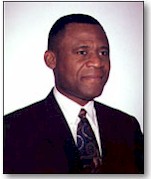
"Contemporees" Meet in Atlanta to Brainstorm
By Tewroh-Wehtoe Sungbeh
The Perspective
September 4, 2001
Liberians in the U. S. who follow politics over the years are kind of accustomed to seeing and reading the endless postings or writings of T. Q. Harris over the internet, his "Contemporary Voice," the official newsletter of the "Liberia Contemporees United Patriotic & Strong," (UPS), as the organization is known, or by whatever means Harris can get his message across to the hundred of thousands of Liberians in the United States and elsewhere.
 Mr. Harris who is General Chairman
of that organization was once a presidential candidate in 1997
(but later joined Dr. Harry Moniba, former vice president of President
Samuel K. Doe, as his running-mate), held what he called a "brainstorming"
meeting in Atlanta, GA on Saturday, September 1, 2001, to discuss
his vision for Liberia, his differences with Charles Taylor, and
the dismal conditions of the Liberian people under Charles Taylor.
Mr. Harris who is General Chairman
of that organization was once a presidential candidate in 1997
(but later joined Dr. Harry Moniba, former vice president of President
Samuel K. Doe, as his running-mate), held what he called a "brainstorming"
meeting in Atlanta, GA on Saturday, September 1, 2001, to discuss
his vision for Liberia, his differences with Charles Taylor, and
the dismal conditions of the Liberian people under Charles Taylor.
According to Mr. Harris, the UPS is not a political party, but a "disciplined political entity" that's open to all Liberians irrespective of their ethnicity and religious affiliations. However, Harris who is ambivalent about running for president in 2003 will not run because he doesn't want to "dignify the process" since there is "inadequate security in place for the Liberian people and the candidates." Adding, how can there be free and fair elections in 2003 when the security of the people is not guarantee"?
At one point during the discussions Harris asked how can he run for president of Liberia while living in the United States. "If I want to be president of Liberia, I want to declare my candidacy in Liberia where the Liberian people are, and not in America."
While the meeting of the Contemporees was poorly attended, members managed to get the participation of ULAA president, Mydea Reeves Karpeh, who seemed to differ politely with Mr. Harris on his security concerns, and was more concerned about the electoral process in 2003, than the elections itself. Ms. Reeves-Karpeh was able to suggest the need for voters' registration and literacy programs. Saying, "let's not abandon the process because of security concerns."
When Harris was asked why he isn't active or collaborating with other community or political organizations in the United States in their collective efforts to remove Charles Taylor from office, but is always sending surrogates to represent him, while preferring to post his messages on the internet or his newsletter? He responded that "most politicians and Liberians in the United States are playing with the Liberian people." However, he is a "disciplined person" who is not interested in attending conferences in the United States only to give empty speeches, but wants to "empower Liberians to be politically active in the affairs of their country."
During one part of the meeting, Nvasekie Konneh, who is the leader of the National Civil Rights Movement, an advocacy group founded to address civil rights issues confronting Mandingoes (muslems) in Liberia, spoke of the need to protect muslems and their place of worships in Liberia.
Mr. Konneh who is also an officer in the U.S. Navy was passionate in his address when he told his audience that muslems in Liberia "seek not a confrontation nor a conflict with anyone, but cooperation, dialogue and understanding, because, "we don't see christian churches being burnt down in Liberia and the perpetrators go unpunished. There is no other group besides the Mandingoes whose right to live in peace in their homes they occupied before the war have been violated in broad daylight."
While T.Q. Harris claimed not to have presidential aspirations for the 2003 election until there is a guarantee for adequate security for himself and the electorates, he sounded more like a candidate than one who is on a brainstorming tour.
The sweet-talking politician dabbled from topics as controversial as dual citizenship for Liberians in the U.S. and their country which he favors, while questioning the current motto, seal and the Liberian flag. Asking, "do we agree to the makeup of our flag? Is the flag the best representation of our nation? Is it the kind of seal we want? Will Liberians ever want to die for their flag like the Americans die for their flag?"
T. Q. Harris have always referred to himself as the "Honorable" While he may not be the honorable to some, he sure is that to many of his ardent supporters who looked to him for leadership in these critical times when the political parties are in dire need for strong leadership. However, the jury is still out on his leadership.
His weakness is his inability to get out there into the trenches and commingle with other politicians, political parties, grassroots and community organizations in order to network, strategize, learn and find common grounds in the art of coalition-building, and how to get votes and win elections, especially when a nation is faced with an armed dictator like Charles Taylor, who is desperate and will do anything illegal and wicked to be reelected president of Liberia. His will have to understand that no politician is an island. By writing other politicians off as those who are only interested in giving empty speeches, and not caring for the plight of the Liberian people shows his arrogant side, and violates the cardinal rule about unity in these critical times. Because in these crucial times, a single political "entity," party, or politician cannot do it all.